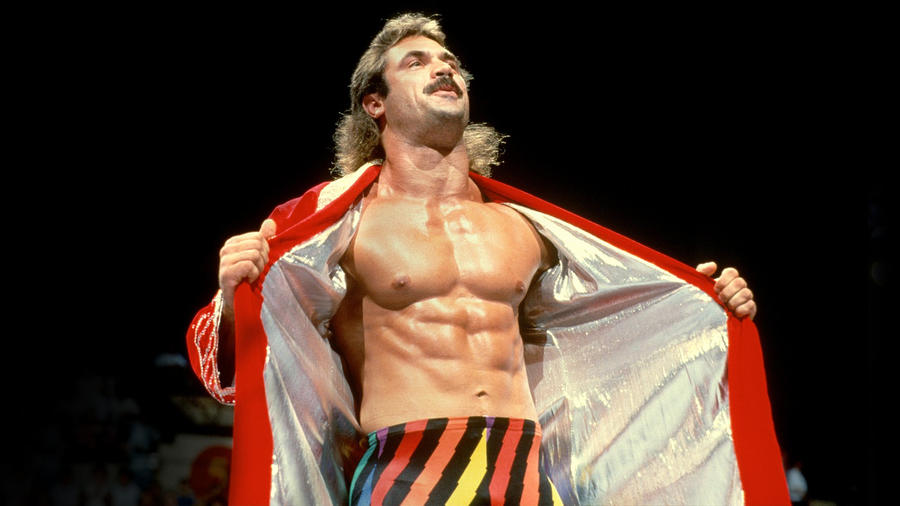
On a recent edition of his “The ARN Show” podcast, WWE Hall of Famer Arn Anderson discussed the career-ending back injury that Rick Rude suffered while taking a suicide dive.
Rude performed the high-flying move at ringside and landed on the corner of the raised platform surrounding the ring.
You can check out some highlights from the podcast below:
On Rick Rude’s career-ending back injury over in Japan: “You know, you always hate to hear about somebody getting hurt. Because I immediately go to, ‘Okay, he’s hurt. He’s a tough son of a gun.’ You know, Rick Rude. And to get through the match, I have no doubt that he gritted his teeth and got through it. You might not have even known he was hurt unless you knew what you were looking at. But now he’s got to fly home. It’s the dark part of the business that nobody ever thinks about or everybody knows. So now this guy had to somehow lay on a very small, uncomfortable bed till the next morning. Go to the airport really, really early, at least two hours early. And he gets on a 13-hour flight to America. And however they routed him; if they went to LA, he could have had a three or four-hour layover in LA and then five more hours to the East Coast. That’s the reality that you don’t see away from the actual matches.”
On Rude’s career ending: “Oh, we never think that [our careers are over at first]. I know I didn’t until the episode in the gym with the guy a little bit ago who slapped me on the back. I’m sure Rude thought, ‘Okay, I’m dinged up. I’m gonna get on this damn flight, and I’m gonna drink all the vodka that they will give me, and try to get through.’ 13 hours, even if you’re up in first class, is not pleasurable. And you know, it’s just, I wanted to throw that out there because it’s the unsung part of what we do that it would kill a normal person. It would absolutely kill you. Besides the fact that other, you know, the ramifications have been his last match, who would have known who would have thought it?”
On whether he had a Lloyd’s of London policy: “I heard it was very expensive. You know, and I couldn’t afford it. There’s no way I could have, that would have fit our budget. I mean, I heard numbers of like $15,000 a year premiums or something like that. And that’s back in the early 90s. It’s a lot of money. You know, and you had to go through quite a bit of testing and a lot of stuff, and be declared I think, even by a couple of doctors, that you were no longer able to wrestle. It wasn’t just, ‘Cash in your policy.’ I think there was a lot of stuff that a lot of guys had to go through, as well.”
In a recent episode of his podcast, “The ARN Show,” WWE Hall of Famer Arn Anderson discussed the career-ending back injury suffered by Rick Rude during a suicide dive. Rude, known for his high-flying moves, performed the risky maneuver at ringside and unfortunately landed on the corner of the raised platform surrounding the ring.
Anderson expressed his concern for Rude’s injury, acknowledging his toughness and determination to finish the match despite the pain. He highlighted the often overlooked dark side of the wrestling business – the aftermath of injuries. After the match, Rude had to endure a long flight back to America, lying on an uncomfortable bed and enduring layovers and hours of travel. This aspect of wrestling is rarely seen by fans but is a harsh reality for the performers.
When asked about Rude’s career-ending injury, Anderson admitted that wrestlers rarely think their careers are over at first. He shared a personal experience of realizing his own career was coming to an end after an incident in the gym. Similarly, Rude likely believed he could tough it out and continue wrestling. However, the 13-hour flight back home, even in first class, would have been far from enjoyable.
Anderson emphasized that the physical toll on wrestlers is often underestimated. The pain and discomfort they endure during flights and travel can be excruciating. He wanted to shed light on this unsung part of their profession that would be unbearable for an average person. Rude’s last match turned out to be his final one, a fact that no one could have predicted or anticipated.
When asked about insurance policies like Lloyd’s of London, which some wrestlers had to protect themselves financially in case of career-ending injuries, Anderson revealed that it was expensive and not feasible for everyone. Premiums were reportedly around $15,000 per year in the early 90s, a significant amount for wrestlers on a budget. Additionally, wrestlers had to go through extensive testing and be declared unfit to wrestle by multiple doctors before cashing in their policies.
The podcast episode also included a video clip of Rude’s last match, providing fans with a glimpse into the moment that ultimately ended his career.
Overall, Anderson’s discussion on his podcast sheds light on the physical toll and challenges that wrestlers face, both during their careers and after sustaining injuries. It serves as a reminder that behind the glitz and glamour of professional wrestling, there is a harsh reality that often goes unnoticed by fans.
